Impact of Changing Consumer Behaviour on Hotel and Hospitality
VerifiedAdded on 2020/05/16
|9
|2653
|102
Report
AI Summary
This report delves into the dynamic relationship between consumer behavior and customer expectations within the hotel and hospitality management sector. It critically evaluates how evolving consumer trends, influenced by factors like digital content and online accessibility, are reshaping customer demands. The report examines how international hotel chains, such as Four Seasons, are adapting their strategies to meet these changing expectations, focusing on service quality, customer satisfaction, and marketing efforts. The analysis covers various aspects of consumer behavior, including cultural, social, and personal factors, and discusses different theories related to customer satisfaction, such as the expectancy-disconfirmation theory and the equity theory. The report also explores the importance of understanding consumer perceptions and expectations in order to enhance service delivery and maintain customer loyalty. Ultimately, the report highlights the significance of adapting to consumer needs to ensure the profitability and success of hotels and hospitality businesses in the face of evolving market dynamics.
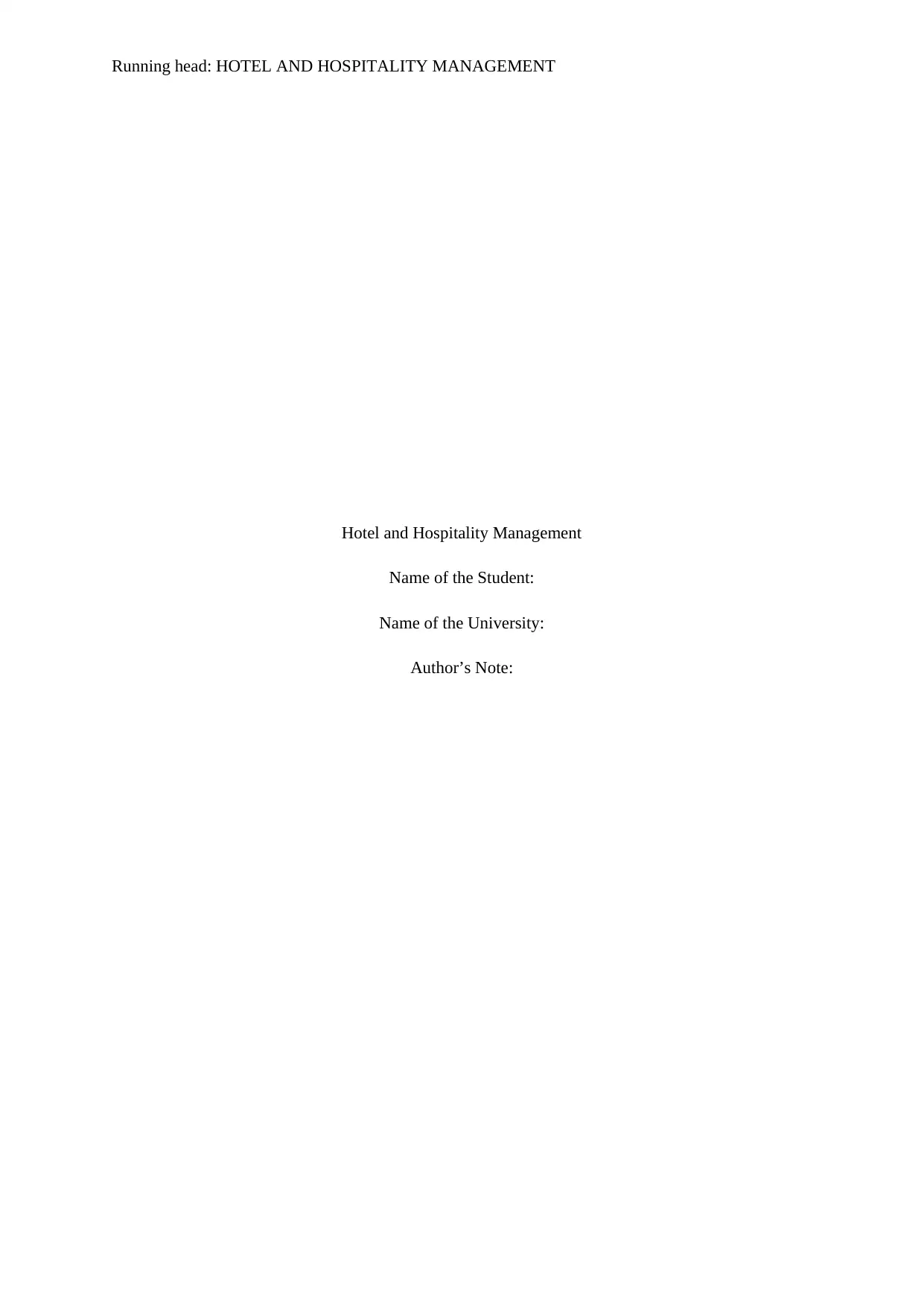
Running head: HOTEL AND HOSPITALITY MANAGEMENT
Hotel and Hospitality Management
Name of the Student:
Name of the University:
Author’s Note:
Hotel and Hospitality Management
Name of the Student:
Name of the University:
Author’s Note:
Paraphrase This Document
Need a fresh take? Get an instant paraphrase of this document with our AI Paraphraser
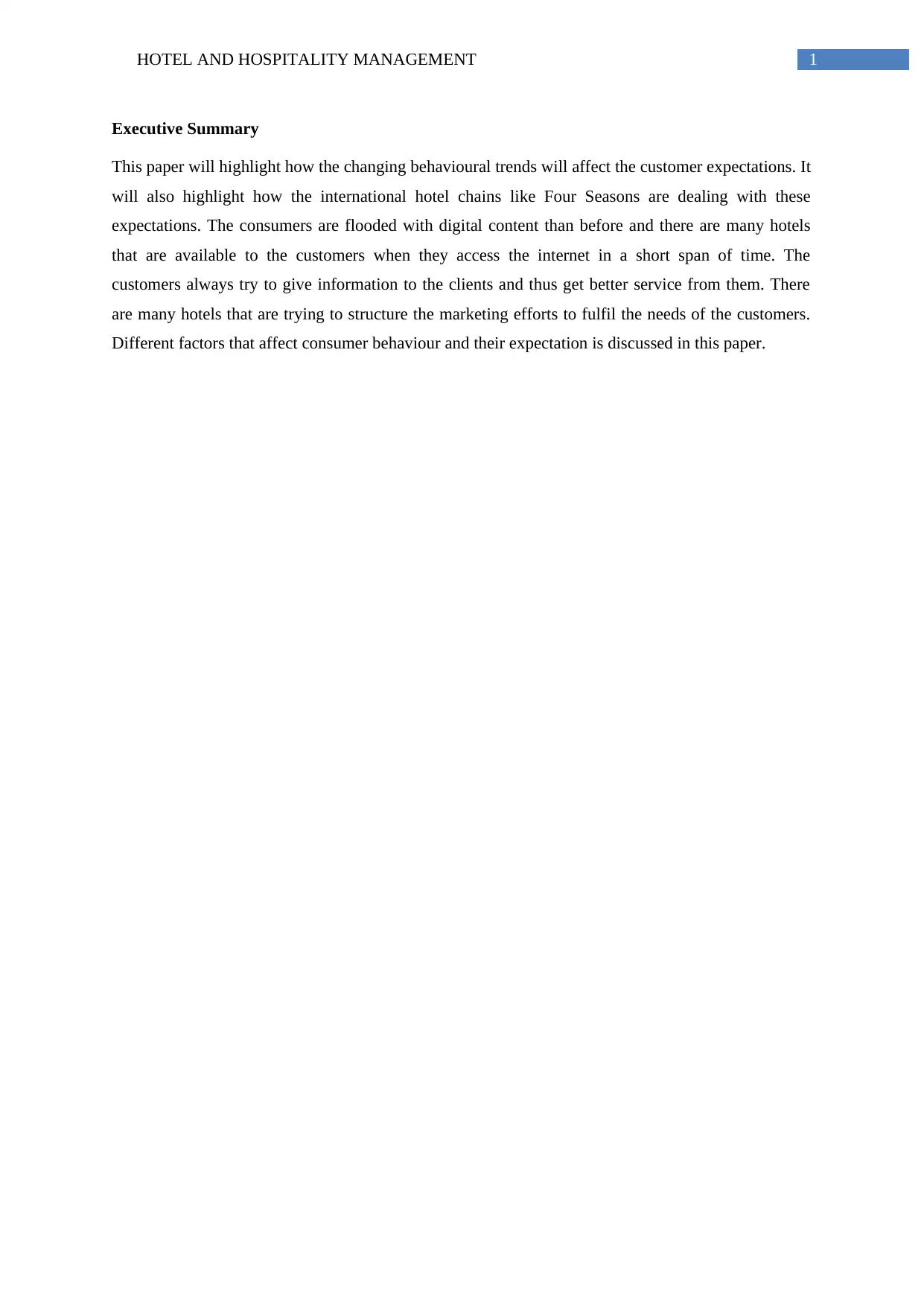
1HOTEL AND HOSPITALITY MANAGEMENT
Executive Summary
This paper will highlight how the changing behavioural trends will affect the customer expectations. It
will also highlight how the international hotel chains like Four Seasons are dealing with these
expectations. The consumers are flooded with digital content than before and there are many hotels
that are available to the customers when they access the internet in a short span of time. The
customers always try to give information to the clients and thus get better service from them. There
are many hotels that are trying to structure the marketing efforts to fulfil the needs of the customers.
Different factors that affect consumer behaviour and their expectation is discussed in this paper.
Executive Summary
This paper will highlight how the changing behavioural trends will affect the customer expectations. It
will also highlight how the international hotel chains like Four Seasons are dealing with these
expectations. The consumers are flooded with digital content than before and there are many hotels
that are available to the customers when they access the internet in a short span of time. The
customers always try to give information to the clients and thus get better service from them. There
are many hotels that are trying to structure the marketing efforts to fulfil the needs of the customers.
Different factors that affect consumer behaviour and their expectation is discussed in this paper.
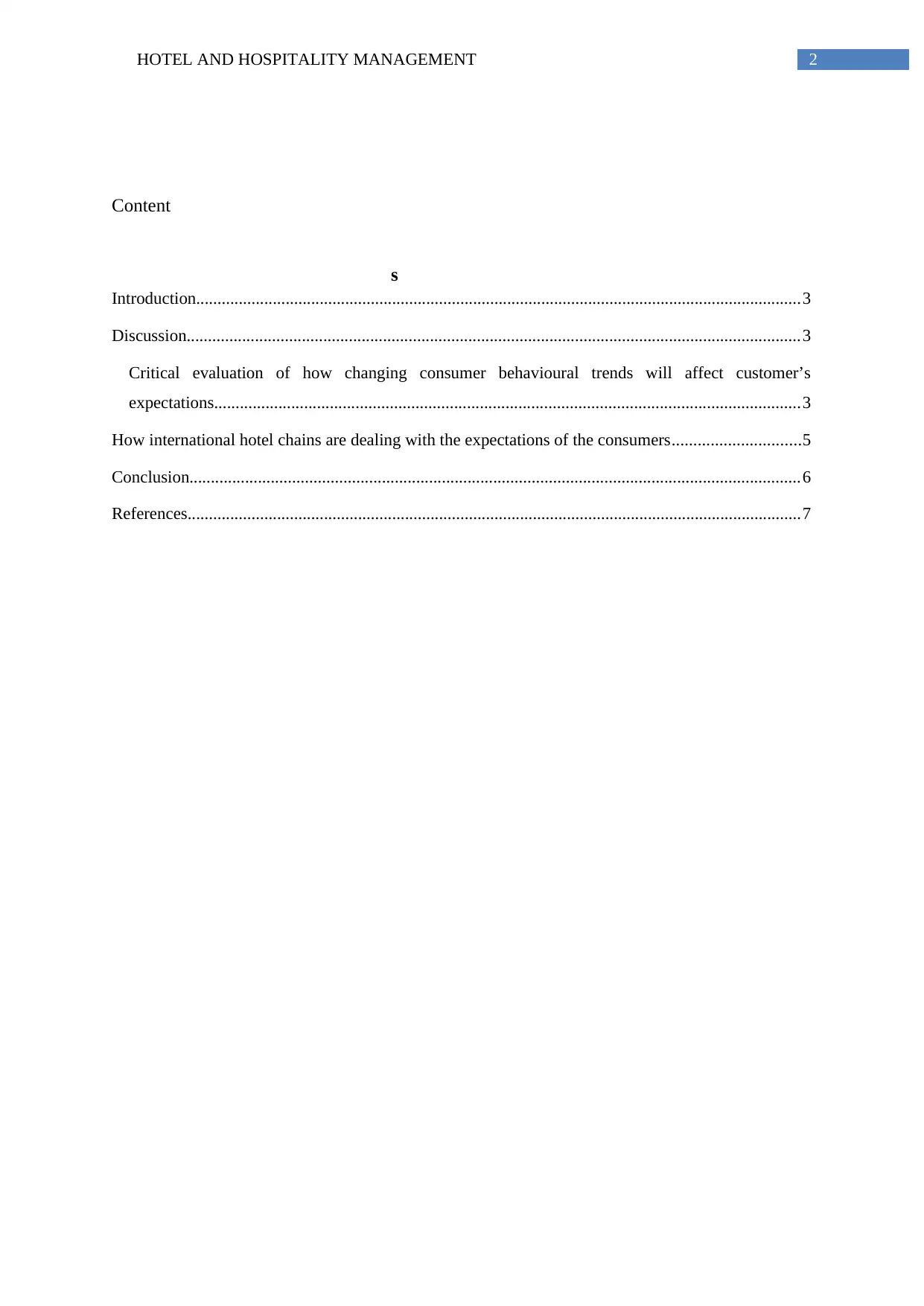
2HOTEL AND HOSPITALITY MANAGEMENT
Content
s
Introduction..............................................................................................................................................3
Discussion................................................................................................................................................3
Critical evaluation of how changing consumer behavioural trends will affect customer’s
expectations.........................................................................................................................................3
How international hotel chains are dealing with the expectations of the consumers..............................5
Conclusion...............................................................................................................................................6
References................................................................................................................................................7
Content
s
Introduction..............................................................................................................................................3
Discussion................................................................................................................................................3
Critical evaluation of how changing consumer behavioural trends will affect customer’s
expectations.........................................................................................................................................3
How international hotel chains are dealing with the expectations of the consumers..............................5
Conclusion...............................................................................................................................................6
References................................................................................................................................................7
⊘ This is a preview!⊘
Do you want full access?
Subscribe today to unlock all pages.

Trusted by 1+ million students worldwide
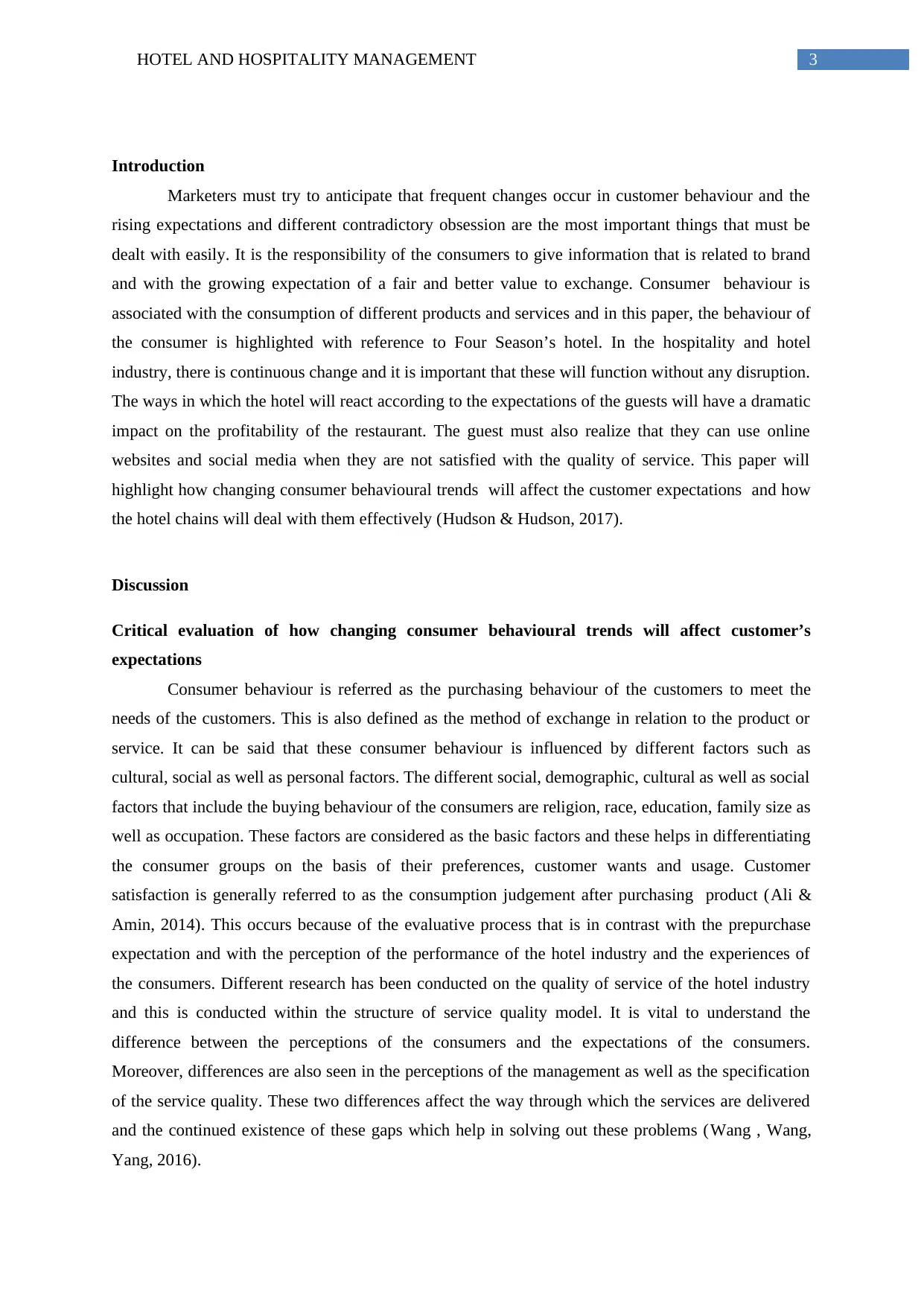
3HOTEL AND HOSPITALITY MANAGEMENT
Introduction
Marketers must try to anticipate that frequent changes occur in customer behaviour and the
rising expectations and different contradictory obsession are the most important things that must be
dealt with easily. It is the responsibility of the consumers to give information that is related to brand
and with the growing expectation of a fair and better value to exchange. Consumer behaviour is
associated with the consumption of different products and services and in this paper, the behaviour of
the consumer is highlighted with reference to Four Season’s hotel. In the hospitality and hotel
industry, there is continuous change and it is important that these will function without any disruption.
The ways in which the hotel will react according to the expectations of the guests will have a dramatic
impact on the profitability of the restaurant. The guest must also realize that they can use online
websites and social media when they are not satisfied with the quality of service. This paper will
highlight how changing consumer behavioural trends will affect the customer expectations and how
the hotel chains will deal with them effectively (Hudson & Hudson, 2017).
Discussion
Critical evaluation of how changing consumer behavioural trends will affect customer’s
expectations
Consumer behaviour is referred as the purchasing behaviour of the customers to meet the
needs of the customers. This is also defined as the method of exchange in relation to the product or
service. It can be said that these consumer behaviour is influenced by different factors such as
cultural, social as well as personal factors. The different social, demographic, cultural as well as social
factors that include the buying behaviour of the consumers are religion, race, education, family size as
well as occupation. These factors are considered as the basic factors and these helps in differentiating
the consumer groups on the basis of their preferences, customer wants and usage. Customer
satisfaction is generally referred to as the consumption judgement after purchasing product (Ali &
Amin, 2014). This occurs because of the evaluative process that is in contrast with the prepurchase
expectation and with the perception of the performance of the hotel industry and the experiences of
the consumers. Different research has been conducted on the quality of service of the hotel industry
and this is conducted within the structure of service quality model. It is vital to understand the
difference between the perceptions of the consumers and the expectations of the consumers.
Moreover, differences are also seen in the perceptions of the management as well as the specification
of the service quality. These two differences affect the way through which the services are delivered
and the continued existence of these gaps which help in solving out these problems (Wang , Wang,
Yang, 2016).
Introduction
Marketers must try to anticipate that frequent changes occur in customer behaviour and the
rising expectations and different contradictory obsession are the most important things that must be
dealt with easily. It is the responsibility of the consumers to give information that is related to brand
and with the growing expectation of a fair and better value to exchange. Consumer behaviour is
associated with the consumption of different products and services and in this paper, the behaviour of
the consumer is highlighted with reference to Four Season’s hotel. In the hospitality and hotel
industry, there is continuous change and it is important that these will function without any disruption.
The ways in which the hotel will react according to the expectations of the guests will have a dramatic
impact on the profitability of the restaurant. The guest must also realize that they can use online
websites and social media when they are not satisfied with the quality of service. This paper will
highlight how changing consumer behavioural trends will affect the customer expectations and how
the hotel chains will deal with them effectively (Hudson & Hudson, 2017).
Discussion
Critical evaluation of how changing consumer behavioural trends will affect customer’s
expectations
Consumer behaviour is referred as the purchasing behaviour of the customers to meet the
needs of the customers. This is also defined as the method of exchange in relation to the product or
service. It can be said that these consumer behaviour is influenced by different factors such as
cultural, social as well as personal factors. The different social, demographic, cultural as well as social
factors that include the buying behaviour of the consumers are religion, race, education, family size as
well as occupation. These factors are considered as the basic factors and these helps in differentiating
the consumer groups on the basis of their preferences, customer wants and usage. Customer
satisfaction is generally referred to as the consumption judgement after purchasing product (Ali &
Amin, 2014). This occurs because of the evaluative process that is in contrast with the prepurchase
expectation and with the perception of the performance of the hotel industry and the experiences of
the consumers. Different research has been conducted on the quality of service of the hotel industry
and this is conducted within the structure of service quality model. It is vital to understand the
difference between the perceptions of the consumers and the expectations of the consumers.
Moreover, differences are also seen in the perceptions of the management as well as the specification
of the service quality. These two differences affect the way through which the services are delivered
and the continued existence of these gaps which help in solving out these problems (Wang , Wang,
Yang, 2016).
Paraphrase This Document
Need a fresh take? Get an instant paraphrase of this document with our AI Paraphraser
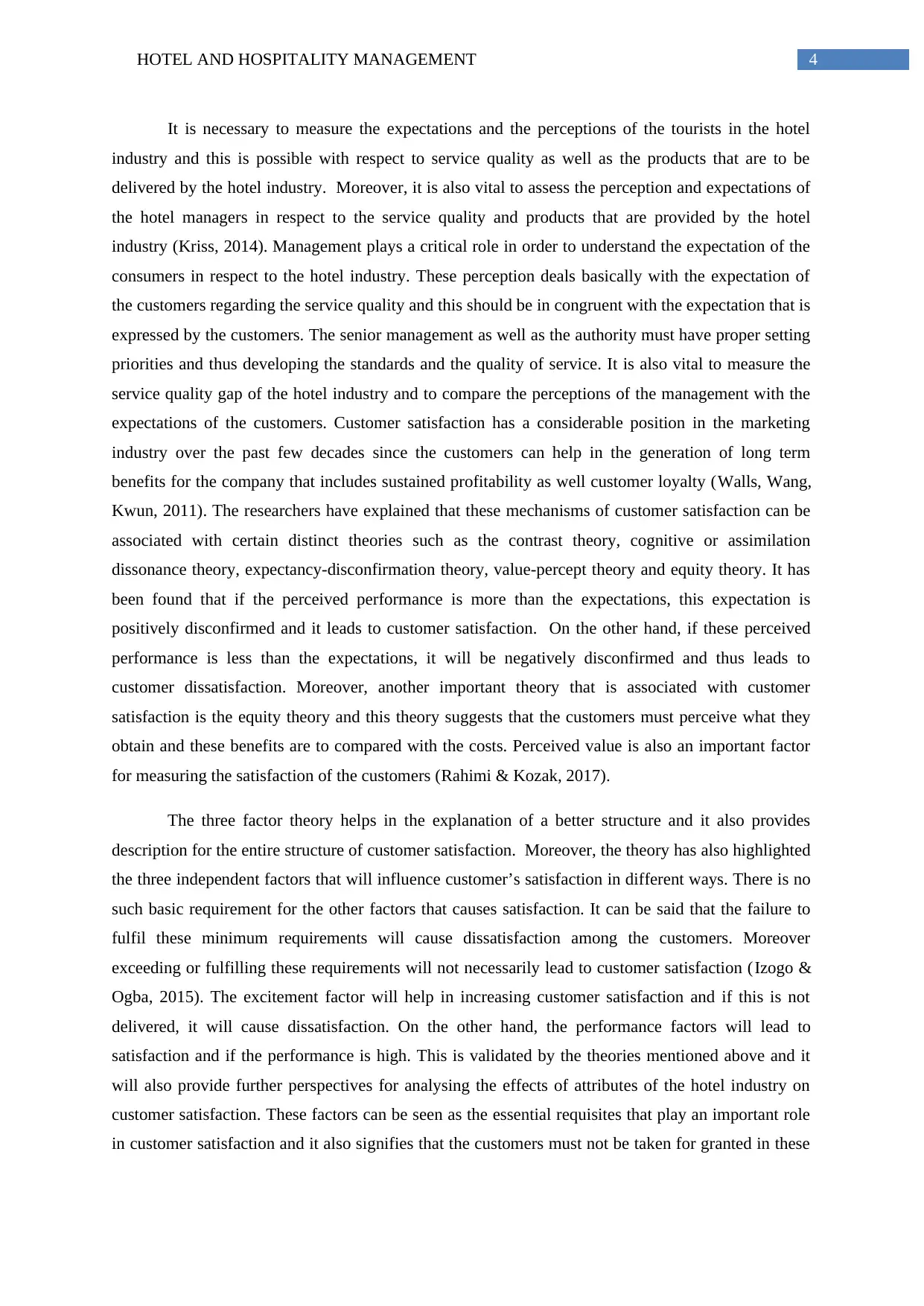
4HOTEL AND HOSPITALITY MANAGEMENT
It is necessary to measure the expectations and the perceptions of the tourists in the hotel
industry and this is possible with respect to service quality as well as the products that are to be
delivered by the hotel industry. Moreover, it is also vital to assess the perception and expectations of
the hotel managers in respect to the service quality and products that are provided by the hotel
industry (Kriss, 2014). Management plays a critical role in order to understand the expectation of the
consumers in respect to the hotel industry. These perception deals basically with the expectation of
the customers regarding the service quality and this should be in congruent with the expectation that is
expressed by the customers. The senior management as well as the authority must have proper setting
priorities and thus developing the standards and the quality of service. It is also vital to measure the
service quality gap of the hotel industry and to compare the perceptions of the management with the
expectations of the customers. Customer satisfaction has a considerable position in the marketing
industry over the past few decades since the customers can help in the generation of long term
benefits for the company that includes sustained profitability as well customer loyalty (Walls, Wang,
Kwun, 2011). The researchers have explained that these mechanisms of customer satisfaction can be
associated with certain distinct theories such as the contrast theory, cognitive or assimilation
dissonance theory, expectancy-disconfirmation theory, value-percept theory and equity theory. It has
been found that if the perceived performance is more than the expectations, this expectation is
positively disconfirmed and it leads to customer satisfaction. On the other hand, if these perceived
performance is less than the expectations, it will be negatively disconfirmed and thus leads to
customer dissatisfaction. Moreover, another important theory that is associated with customer
satisfaction is the equity theory and this theory suggests that the customers must perceive what they
obtain and these benefits are to compared with the costs. Perceived value is also an important factor
for measuring the satisfaction of the customers (Rahimi & Kozak, 2017).
The three factor theory helps in the explanation of a better structure and it also provides
description for the entire structure of customer satisfaction. Moreover, the theory has also highlighted
the three independent factors that will influence customer’s satisfaction in different ways. There is no
such basic requirement for the other factors that causes satisfaction. It can be said that the failure to
fulfil these minimum requirements will cause dissatisfaction among the customers. Moreover
exceeding or fulfilling these requirements will not necessarily lead to customer satisfaction (Izogo &
Ogba, 2015). The excitement factor will help in increasing customer satisfaction and if this is not
delivered, it will cause dissatisfaction. On the other hand, the performance factors will lead to
satisfaction and if the performance is high. This is validated by the theories mentioned above and it
will also provide further perspectives for analysing the effects of attributes of the hotel industry on
customer satisfaction. These factors can be seen as the essential requisites that play an important role
in customer satisfaction and it also signifies that the customers must not be taken for granted in these
It is necessary to measure the expectations and the perceptions of the tourists in the hotel
industry and this is possible with respect to service quality as well as the products that are to be
delivered by the hotel industry. Moreover, it is also vital to assess the perception and expectations of
the hotel managers in respect to the service quality and products that are provided by the hotel
industry (Kriss, 2014). Management plays a critical role in order to understand the expectation of the
consumers in respect to the hotel industry. These perception deals basically with the expectation of
the customers regarding the service quality and this should be in congruent with the expectation that is
expressed by the customers. The senior management as well as the authority must have proper setting
priorities and thus developing the standards and the quality of service. It is also vital to measure the
service quality gap of the hotel industry and to compare the perceptions of the management with the
expectations of the customers. Customer satisfaction has a considerable position in the marketing
industry over the past few decades since the customers can help in the generation of long term
benefits for the company that includes sustained profitability as well customer loyalty (Walls, Wang,
Kwun, 2011). The researchers have explained that these mechanisms of customer satisfaction can be
associated with certain distinct theories such as the contrast theory, cognitive or assimilation
dissonance theory, expectancy-disconfirmation theory, value-percept theory and equity theory. It has
been found that if the perceived performance is more than the expectations, this expectation is
positively disconfirmed and it leads to customer satisfaction. On the other hand, if these perceived
performance is less than the expectations, it will be negatively disconfirmed and thus leads to
customer dissatisfaction. Moreover, another important theory that is associated with customer
satisfaction is the equity theory and this theory suggests that the customers must perceive what they
obtain and these benefits are to compared with the costs. Perceived value is also an important factor
for measuring the satisfaction of the customers (Rahimi & Kozak, 2017).
The three factor theory helps in the explanation of a better structure and it also provides
description for the entire structure of customer satisfaction. Moreover, the theory has also highlighted
the three independent factors that will influence customer’s satisfaction in different ways. There is no
such basic requirement for the other factors that causes satisfaction. It can be said that the failure to
fulfil these minimum requirements will cause dissatisfaction among the customers. Moreover
exceeding or fulfilling these requirements will not necessarily lead to customer satisfaction (Izogo &
Ogba, 2015). The excitement factor will help in increasing customer satisfaction and if this is not
delivered, it will cause dissatisfaction. On the other hand, the performance factors will lead to
satisfaction and if the performance is high. This is validated by the theories mentioned above and it
will also provide further perspectives for analysing the effects of attributes of the hotel industry on
customer satisfaction. These factors can be seen as the essential requisites that play an important role
in customer satisfaction and it also signifies that the customers must not be taken for granted in these
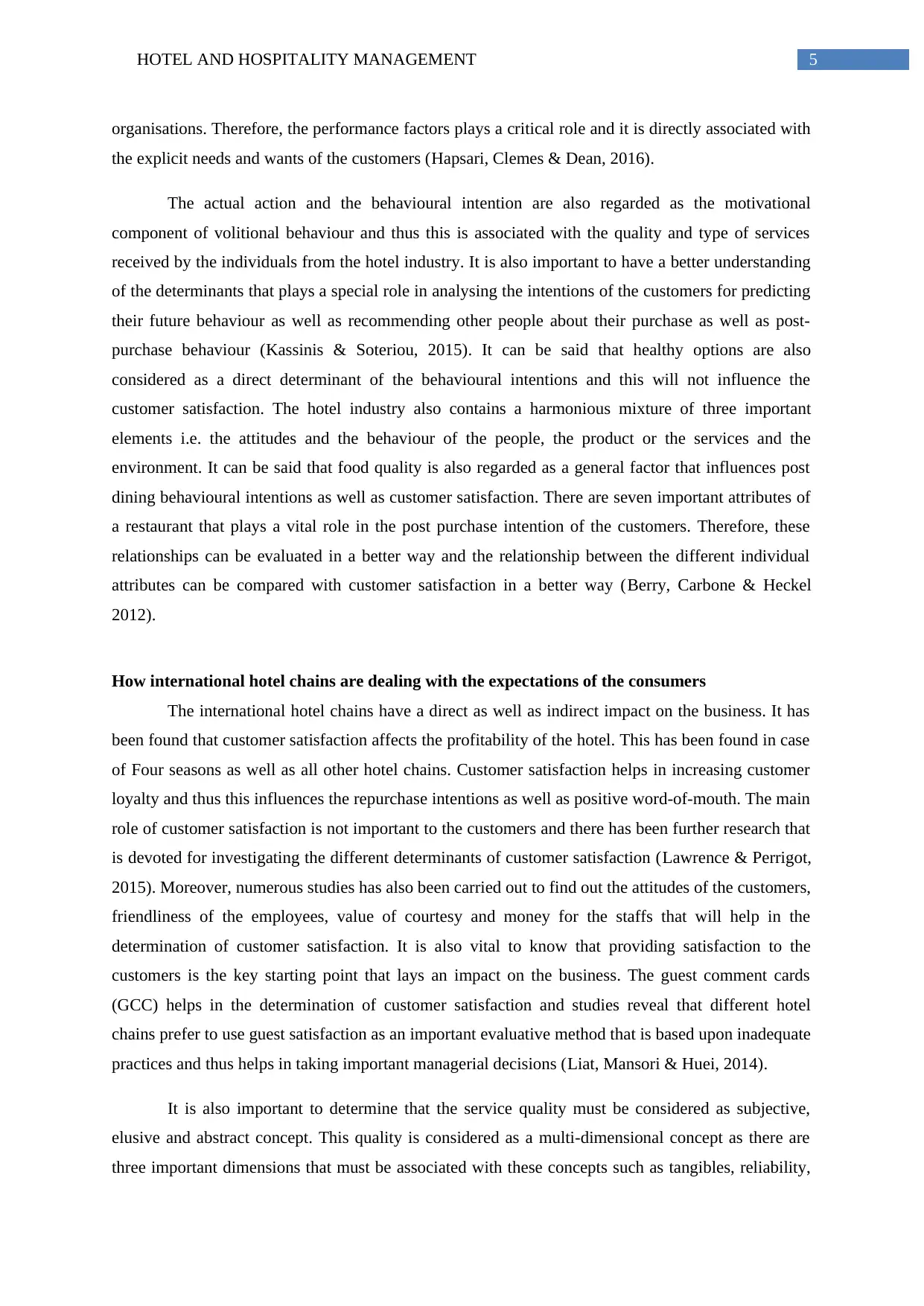
5HOTEL AND HOSPITALITY MANAGEMENT
organisations. Therefore, the performance factors plays a critical role and it is directly associated with
the explicit needs and wants of the customers (Hapsari, Clemes & Dean, 2016).
The actual action and the behavioural intention are also regarded as the motivational
component of volitional behaviour and thus this is associated with the quality and type of services
received by the individuals from the hotel industry. It is also important to have a better understanding
of the determinants that plays a special role in analysing the intentions of the customers for predicting
their future behaviour as well as recommending other people about their purchase as well as post-
purchase behaviour (Kassinis & Soteriou, 2015). It can be said that healthy options are also
considered as a direct determinant of the behavioural intentions and this will not influence the
customer satisfaction. The hotel industry also contains a harmonious mixture of three important
elements i.e. the attitudes and the behaviour of the people, the product or the services and the
environment. It can be said that food quality is also regarded as a general factor that influences post
dining behavioural intentions as well as customer satisfaction. There are seven important attributes of
a restaurant that plays a vital role in the post purchase intention of the customers. Therefore, these
relationships can be evaluated in a better way and the relationship between the different individual
attributes can be compared with customer satisfaction in a better way (Berry, Carbone & Heckel
2012).
How international hotel chains are dealing with the expectations of the consumers
The international hotel chains have a direct as well as indirect impact on the business. It has
been found that customer satisfaction affects the profitability of the hotel. This has been found in case
of Four seasons as well as all other hotel chains. Customer satisfaction helps in increasing customer
loyalty and thus this influences the repurchase intentions as well as positive word-of-mouth. The main
role of customer satisfaction is not important to the customers and there has been further research that
is devoted for investigating the different determinants of customer satisfaction (Lawrence & Perrigot,
2015). Moreover, numerous studies has also been carried out to find out the attitudes of the customers,
friendliness of the employees, value of courtesy and money for the staffs that will help in the
determination of customer satisfaction. It is also vital to know that providing satisfaction to the
customers is the key starting point that lays an impact on the business. The guest comment cards
(GCC) helps in the determination of customer satisfaction and studies reveal that different hotel
chains prefer to use guest satisfaction as an important evaluative method that is based upon inadequate
practices and thus helps in taking important managerial decisions (Liat, Mansori & Huei, 2014).
It is also important to determine that the service quality must be considered as subjective,
elusive and abstract concept. This quality is considered as a multi-dimensional concept as there are
three important dimensions that must be associated with these concepts such as tangibles, reliability,
organisations. Therefore, the performance factors plays a critical role and it is directly associated with
the explicit needs and wants of the customers (Hapsari, Clemes & Dean, 2016).
The actual action and the behavioural intention are also regarded as the motivational
component of volitional behaviour and thus this is associated with the quality and type of services
received by the individuals from the hotel industry. It is also important to have a better understanding
of the determinants that plays a special role in analysing the intentions of the customers for predicting
their future behaviour as well as recommending other people about their purchase as well as post-
purchase behaviour (Kassinis & Soteriou, 2015). It can be said that healthy options are also
considered as a direct determinant of the behavioural intentions and this will not influence the
customer satisfaction. The hotel industry also contains a harmonious mixture of three important
elements i.e. the attitudes and the behaviour of the people, the product or the services and the
environment. It can be said that food quality is also regarded as a general factor that influences post
dining behavioural intentions as well as customer satisfaction. There are seven important attributes of
a restaurant that plays a vital role in the post purchase intention of the customers. Therefore, these
relationships can be evaluated in a better way and the relationship between the different individual
attributes can be compared with customer satisfaction in a better way (Berry, Carbone & Heckel
2012).
How international hotel chains are dealing with the expectations of the consumers
The international hotel chains have a direct as well as indirect impact on the business. It has
been found that customer satisfaction affects the profitability of the hotel. This has been found in case
of Four seasons as well as all other hotel chains. Customer satisfaction helps in increasing customer
loyalty and thus this influences the repurchase intentions as well as positive word-of-mouth. The main
role of customer satisfaction is not important to the customers and there has been further research that
is devoted for investigating the different determinants of customer satisfaction (Lawrence & Perrigot,
2015). Moreover, numerous studies has also been carried out to find out the attitudes of the customers,
friendliness of the employees, value of courtesy and money for the staffs that will help in the
determination of customer satisfaction. It is also vital to know that providing satisfaction to the
customers is the key starting point that lays an impact on the business. The guest comment cards
(GCC) helps in the determination of customer satisfaction and studies reveal that different hotel
chains prefer to use guest satisfaction as an important evaluative method that is based upon inadequate
practices and thus helps in taking important managerial decisions (Liat, Mansori & Huei, 2014).
It is also important to determine that the service quality must be considered as subjective,
elusive and abstract concept. This quality is considered as a multi-dimensional concept as there are
three important dimensions that must be associated with these concepts such as tangibles, reliability,
⊘ This is a preview!⊘
Do you want full access?
Subscribe today to unlock all pages.

Trusted by 1+ million students worldwide
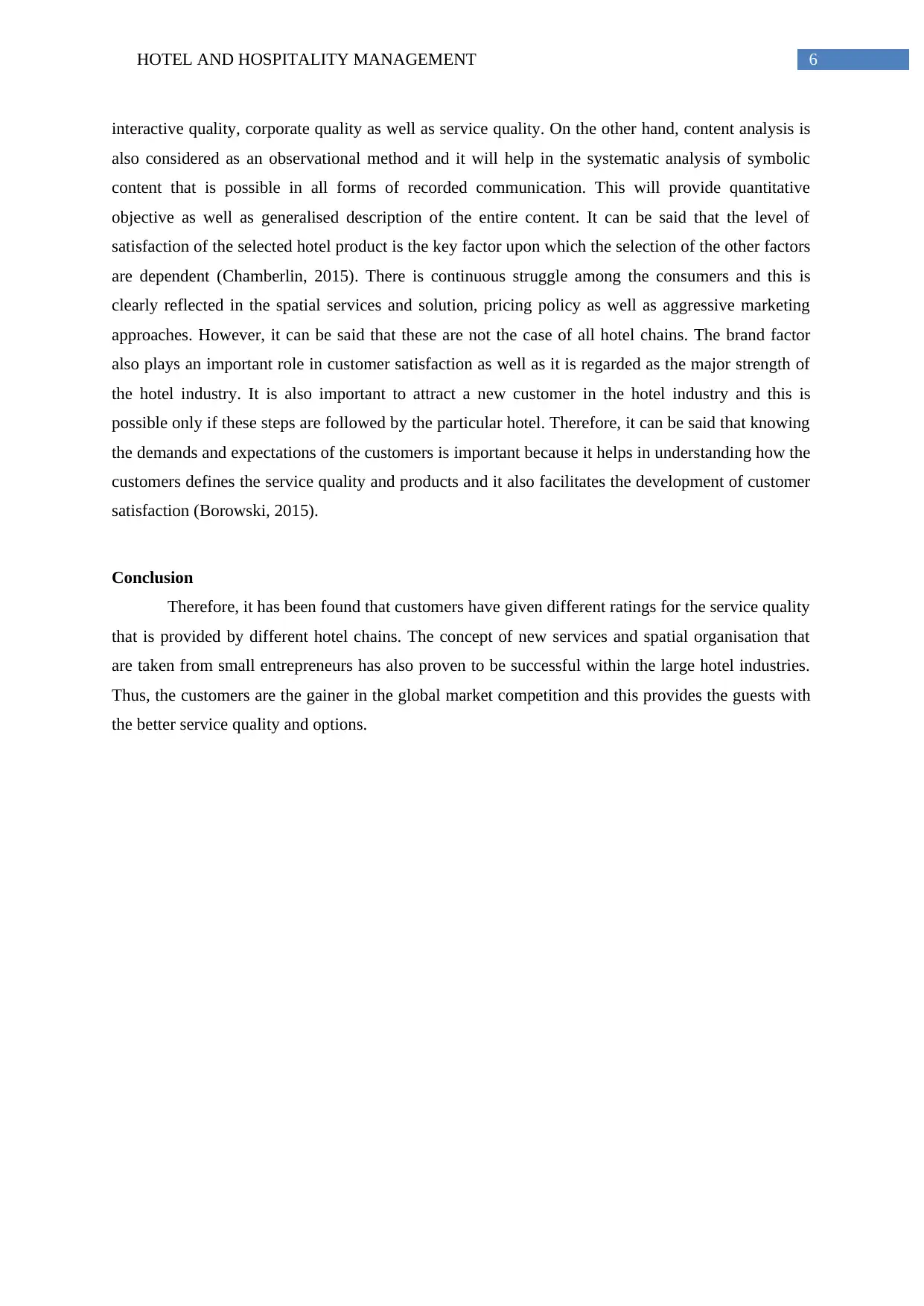
6HOTEL AND HOSPITALITY MANAGEMENT
interactive quality, corporate quality as well as service quality. On the other hand, content analysis is
also considered as an observational method and it will help in the systematic analysis of symbolic
content that is possible in all forms of recorded communication. This will provide quantitative
objective as well as generalised description of the entire content. It can be said that the level of
satisfaction of the selected hotel product is the key factor upon which the selection of the other factors
are dependent (Chamberlin, 2015). There is continuous struggle among the consumers and this is
clearly reflected in the spatial services and solution, pricing policy as well as aggressive marketing
approaches. However, it can be said that these are not the case of all hotel chains. The brand factor
also plays an important role in customer satisfaction as well as it is regarded as the major strength of
the hotel industry. It is also important to attract a new customer in the hotel industry and this is
possible only if these steps are followed by the particular hotel. Therefore, it can be said that knowing
the demands and expectations of the customers is important because it helps in understanding how the
customers defines the service quality and products and it also facilitates the development of customer
satisfaction (Borowski, 2015).
Conclusion
Therefore, it has been found that customers have given different ratings for the service quality
that is provided by different hotel chains. The concept of new services and spatial organisation that
are taken from small entrepreneurs has also proven to be successful within the large hotel industries.
Thus, the customers are the gainer in the global market competition and this provides the guests with
the better service quality and options.
interactive quality, corporate quality as well as service quality. On the other hand, content analysis is
also considered as an observational method and it will help in the systematic analysis of symbolic
content that is possible in all forms of recorded communication. This will provide quantitative
objective as well as generalised description of the entire content. It can be said that the level of
satisfaction of the selected hotel product is the key factor upon which the selection of the other factors
are dependent (Chamberlin, 2015). There is continuous struggle among the consumers and this is
clearly reflected in the spatial services and solution, pricing policy as well as aggressive marketing
approaches. However, it can be said that these are not the case of all hotel chains. The brand factor
also plays an important role in customer satisfaction as well as it is regarded as the major strength of
the hotel industry. It is also important to attract a new customer in the hotel industry and this is
possible only if these steps are followed by the particular hotel. Therefore, it can be said that knowing
the demands and expectations of the customers is important because it helps in understanding how the
customers defines the service quality and products and it also facilitates the development of customer
satisfaction (Borowski, 2015).
Conclusion
Therefore, it has been found that customers have given different ratings for the service quality
that is provided by different hotel chains. The concept of new services and spatial organisation that
are taken from small entrepreneurs has also proven to be successful within the large hotel industries.
Thus, the customers are the gainer in the global market competition and this provides the guests with
the better service quality and options.
Paraphrase This Document
Need a fresh take? Get an instant paraphrase of this document with our AI Paraphraser
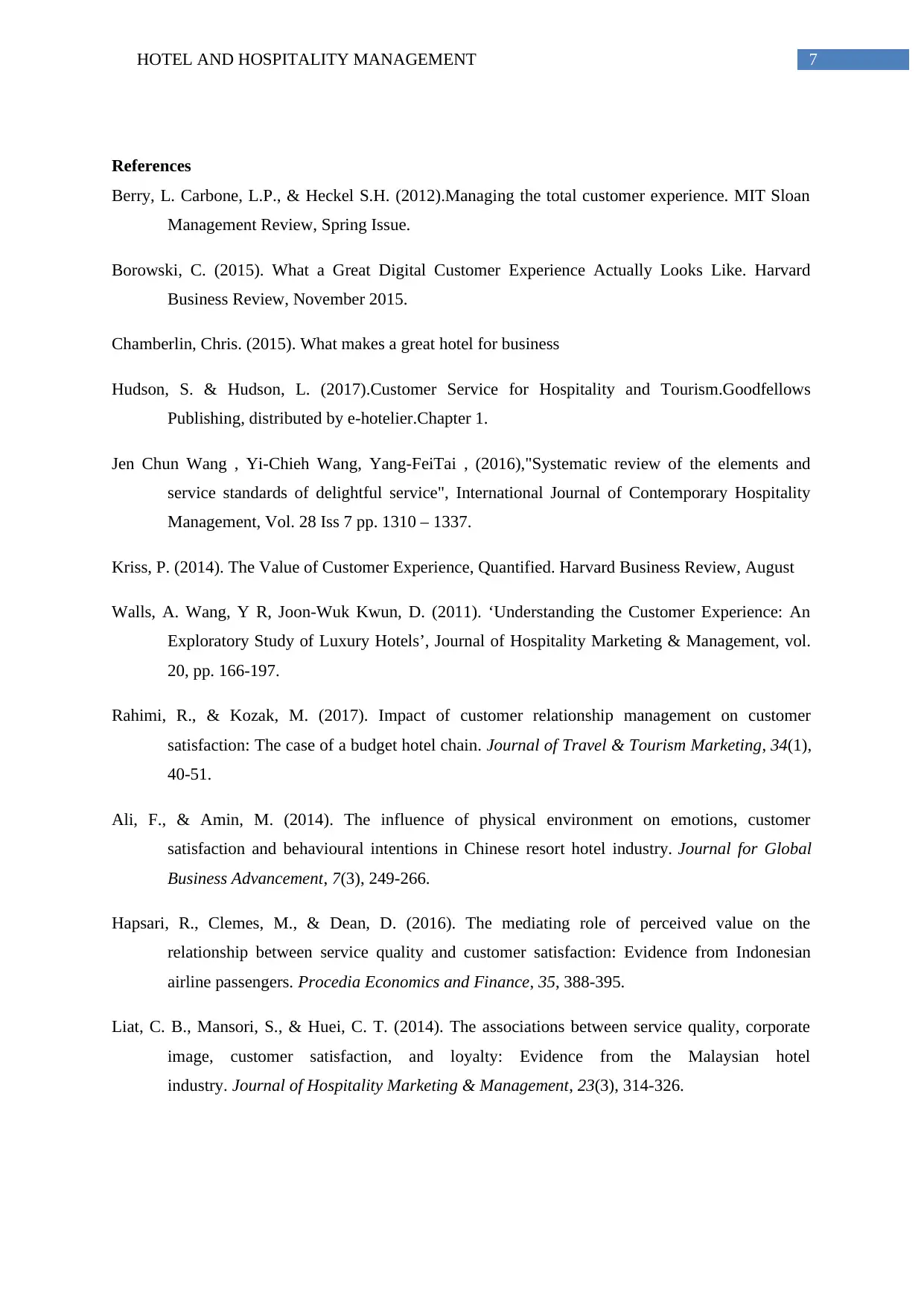
7HOTEL AND HOSPITALITY MANAGEMENT
References
Berry, L. Carbone, L.P., & Heckel S.H. (2012).Managing the total customer experience. MIT Sloan
Management Review, Spring Issue.
Borowski, C. (2015). What a Great Digital Customer Experience Actually Looks Like. Harvard
Business Review, November 2015.
Chamberlin, Chris. (2015). What makes a great hotel for business
Hudson, S. & Hudson, L. (2017).Customer Service for Hospitality and Tourism.Goodfellows
Publishing, distributed by e-hotelier.Chapter 1.
Jen Chun Wang , Yi-Chieh Wang, Yang-FeiTai , (2016),"Systematic review of the elements and
service standards of delightful service", International Journal of Contemporary Hospitality
Management, Vol. 28 Iss 7 pp. 1310 – 1337.
Kriss, P. (2014). The Value of Customer Experience, Quantified. Harvard Business Review, August
Walls, A. Wang, Y R, Joon-Wuk Kwun, D. (2011). ‘Understanding the Customer Experience: An
Exploratory Study of Luxury Hotels’, Journal of Hospitality Marketing & Management, vol.
20, pp. 166-197.
Rahimi, R., & Kozak, M. (2017). Impact of customer relationship management on customer
satisfaction: The case of a budget hotel chain. Journal of Travel & Tourism Marketing, 34(1),
40-51.
Ali, F., & Amin, M. (2014). The influence of physical environment on emotions, customer
satisfaction and behavioural intentions in Chinese resort hotel industry. Journal for Global
Business Advancement, 7(3), 249-266.
Hapsari, R., Clemes, M., & Dean, D. (2016). The mediating role of perceived value on the
relationship between service quality and customer satisfaction: Evidence from Indonesian
airline passengers. Procedia Economics and Finance, 35, 388-395.
Liat, C. B., Mansori, S., & Huei, C. T. (2014). The associations between service quality, corporate
image, customer satisfaction, and loyalty: Evidence from the Malaysian hotel
industry. Journal of Hospitality Marketing & Management, 23(3), 314-326.
References
Berry, L. Carbone, L.P., & Heckel S.H. (2012).Managing the total customer experience. MIT Sloan
Management Review, Spring Issue.
Borowski, C. (2015). What a Great Digital Customer Experience Actually Looks Like. Harvard
Business Review, November 2015.
Chamberlin, Chris. (2015). What makes a great hotel for business
Hudson, S. & Hudson, L. (2017).Customer Service for Hospitality and Tourism.Goodfellows
Publishing, distributed by e-hotelier.Chapter 1.
Jen Chun Wang , Yi-Chieh Wang, Yang-FeiTai , (2016),"Systematic review of the elements and
service standards of delightful service", International Journal of Contemporary Hospitality
Management, Vol. 28 Iss 7 pp. 1310 – 1337.
Kriss, P. (2014). The Value of Customer Experience, Quantified. Harvard Business Review, August
Walls, A. Wang, Y R, Joon-Wuk Kwun, D. (2011). ‘Understanding the Customer Experience: An
Exploratory Study of Luxury Hotels’, Journal of Hospitality Marketing & Management, vol.
20, pp. 166-197.
Rahimi, R., & Kozak, M. (2017). Impact of customer relationship management on customer
satisfaction: The case of a budget hotel chain. Journal of Travel & Tourism Marketing, 34(1),
40-51.
Ali, F., & Amin, M. (2014). The influence of physical environment on emotions, customer
satisfaction and behavioural intentions in Chinese resort hotel industry. Journal for Global
Business Advancement, 7(3), 249-266.
Hapsari, R., Clemes, M., & Dean, D. (2016). The mediating role of perceived value on the
relationship between service quality and customer satisfaction: Evidence from Indonesian
airline passengers. Procedia Economics and Finance, 35, 388-395.
Liat, C. B., Mansori, S., & Huei, C. T. (2014). The associations between service quality, corporate
image, customer satisfaction, and loyalty: Evidence from the Malaysian hotel
industry. Journal of Hospitality Marketing & Management, 23(3), 314-326.
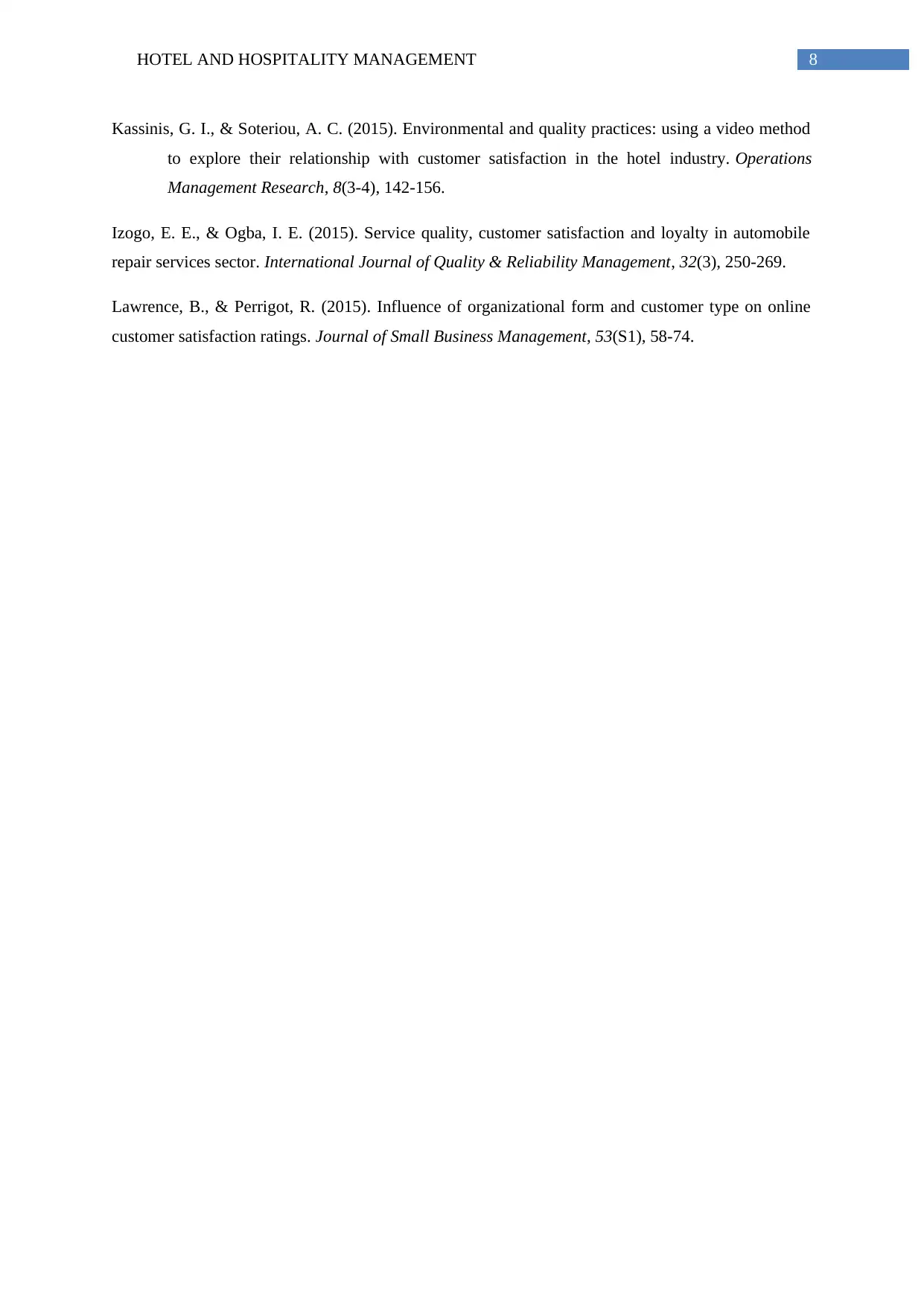
8HOTEL AND HOSPITALITY MANAGEMENT
Kassinis, G. I., & Soteriou, A. C. (2015). Environmental and quality practices: using a video method
to explore their relationship with customer satisfaction in the hotel industry. Operations
Management Research, 8(3-4), 142-156.
Izogo, E. E., & Ogba, I. E. (2015). Service quality, customer satisfaction and loyalty in automobile
repair services sector. International Journal of Quality & Reliability Management, 32(3), 250-269.
Lawrence, B., & Perrigot, R. (2015). Influence of organizational form and customer type on online
customer satisfaction ratings. Journal of Small Business Management, 53(S1), 58-74.
Kassinis, G. I., & Soteriou, A. C. (2015). Environmental and quality practices: using a video method
to explore their relationship with customer satisfaction in the hotel industry. Operations
Management Research, 8(3-4), 142-156.
Izogo, E. E., & Ogba, I. E. (2015). Service quality, customer satisfaction and loyalty in automobile
repair services sector. International Journal of Quality & Reliability Management, 32(3), 250-269.
Lawrence, B., & Perrigot, R. (2015). Influence of organizational form and customer type on online
customer satisfaction ratings. Journal of Small Business Management, 53(S1), 58-74.
⊘ This is a preview!⊘
Do you want full access?
Subscribe today to unlock all pages.

Trusted by 1+ million students worldwide
1 out of 9
Related Documents
Your All-in-One AI-Powered Toolkit for Academic Success.
+13062052269
info@desklib.com
Available 24*7 on WhatsApp / Email
![[object Object]](/_next/static/media/star-bottom.7253800d.svg)
Unlock your academic potential
Copyright © 2020–2026 A2Z Services. All Rights Reserved. Developed and managed by ZUCOL.



